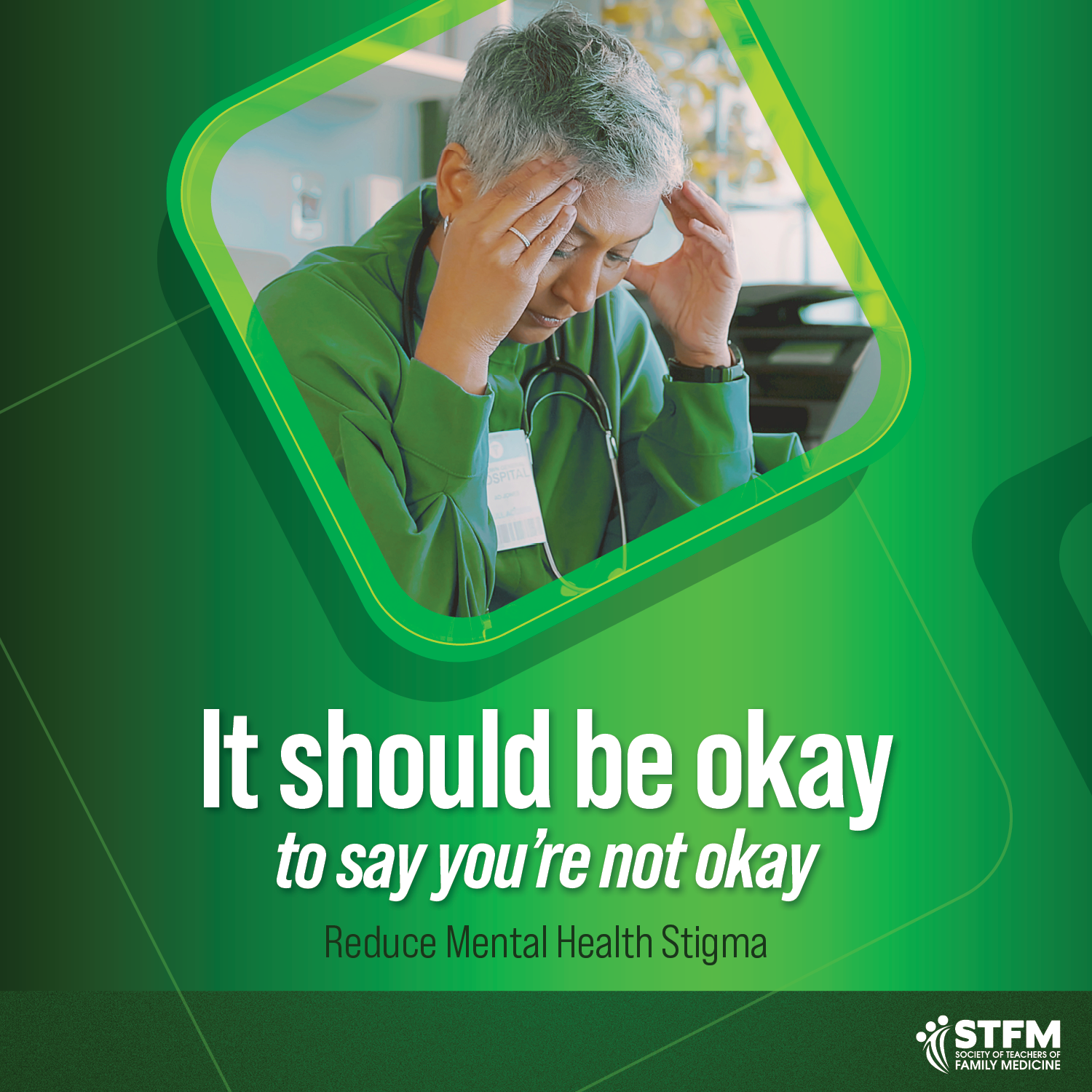Resources for Reducing Mental Health Stigma for Faculty, Residents, and Students
IT SHOULD BE OKAY TO SAY YOU'RE NOT OKAY
Questions on state licensing applications and those used for hospital, medical group, and health plan credentialing should not deter physicians, faculty, residents, and students from getting the care they need. Use these resources to learn more and advocate for change.
The Myth
Toolkits
- STFM Guidance for Program Director Response to Mental Health Questions
- American College of Physicians Advocacy Toolkit: Modernizing License and Credentialing Applications to Not Stigmatize Mental Health
- Dr Lorna Breen Foundation Toolkit: Remove Intrusive Mental Health Questions From Licensure and Credentialing Applications
- AAFP Physician Well-Being Toolkit (includes tools for advocating)
Policies and Positions
- American Medical Association Issue Brief
- Federation of State Medical Boards Policy on Physician Illness and Impairment
Papers
- Consistency Between State Medical License Applications and Recommendations Regarding Physician Mental Health
- FSMB Efforts on Physician Wellness and Burnout
- Medical Licensure Questions About Mental Illness and Compliance with the Americans With Disabilities Act
- Medical Boards Must Avoid Contributing to Mental Health Stigma
- Professional Stigma of Mental Health Issues: Physicians Are Both the Cause and Solution
- 'If you seek help, you risk your career': Physician suicide needs solutions, not silence
Legislation
Plans
Additional Resources
STFM Destigmatizing Mental Health Care Work Group
The above resources were compiled and reviewed by:
Linda Myerholtz, PhD
Director of Behavioral Science Education
University of North Carolina, Chapel Hill
Jordyn Bailey, LCPC, NCC
Instructor of Family & Community Medicine
SIU Decatur Family Medicine Residency
Alexander Brown, PhD
Associate Program Director & Core Faculty
NH Dartmouth Family Medicine Residency
Lauren Brown-Berchtold, M.D.
Associate Program Director, Family Medicine Residency Program
Director, Advanced Obstetrics Fellowship
San Joaquin General Hospital
Lindsay T. Fazio, PhD
Director of Physician Wellbeing and Director of Behavioral Science
University of Chicago Family Medicine Residency
Shira Goldstein, MD
Associate Director of Medical Student Education and Associate Program Director of FM-OB Fellowship
The University of Texas Health Science Center at Houston
Anne M. Lamoureux, PhD
Psychologist and Family Medicine Residency Faculty
Tripler Army Medical Center
Carlie Nikel, PsyD
Associate Program Director and Director of Behavioral Science,
UMKC Community and Family Medicine
Parvathi Perumareddi, DO
Associate Professor, Department of Medicine
Charles E. Schmidt College of Medicine at Florida Atlantic University
Shannon Stark Taylor, PhD
Director of Behavioral Science and Senior Psychologist,
Prisma Health Family Medicine Residency Greenville
Terri Wall, PhD
Director of Behavioral Health
Ascension St. Vincent's Family Medicine Residency Program
Mary Theobald, MBA
Chief of Strategy and Innovation
Society of Teachers of Family Medicine

